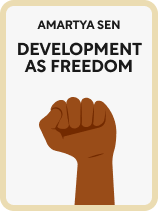

This article is an excerpt from the Shortform book guide to "Development as Freedom" by Amartya Sen. Shortform has the world's best summaries and analyses of books you should be reading.
Like this article? Sign up for a free trial here .
What is poverty, according to Amartya Sen? How can we approach poverty as a social problem?
In Development as Freedom, Nobel Prize-winning economist Amartya Sen argues that economic development is about more than increasing wealth—it must be about expanding freedom. Poverty shouldn’t be just about the amount of income you make; it’s also about the lack of rights you have.
Learn more about this ethical approach by Amartya Sen, poverty as capability deprivation, and development as freedom.
Amartya Sen on Poverty and Economic Development
In redefining development as freedom, Amartya Sen takes a holistic view of poverty and characterizes it as impeding people’s ability to lead the lives they want.
Most definitions of poverty are based only on the level of income. However, poverty has a much more nuanced definition, according to Amartya Sen. Poverty isn’t solely defined by income, and doesn’t tell the whole story of well-being.
Sen contends that income and wealth are only important as a means to something else, not for their own sake. As such, poverty is about more than low income; it’s about a lack of opportunity. Conversely, development is about more than simply increasing wealth; it’s about increasing opportunity.
Sen contends that poverty is harmful and unjust because it deprives people of the ability to lead the lives they want, and development is valuable because it allows people to improve their lives as they see fit.
Sen and the Human Development Index
Sen’s work on redefining poverty has had practical implications for policy-making. With Sen’s help, the United Nations established the Human Development Index, which provides a more comprehensive metric of welfare than just income. The index is composed of three parts:
- Life expectancy at birth
- Years of schooling per adult and expected schooling of children
- Gross National Income per capita
Each part is indexed on a scale from 0 to 1, and the three scores are then averaged to get a single score from 0 to 1. The UN believes this “capabilities approach” to development offers a more useful metric than GDP or GNI because health and education affect development as well.
By utilizing the Human Development Index, Sen hopes to provide a clearer picture of advances in developing nations, as well as to identify the areas that still require improvement.
Poverty as “Capability Deprivation”
Amartya Sen defines poverty as “capability deprivation,” (he also refers to it as “unfreedom”)— which means hindering people’s chances to improve their station in life. There are two main benefits to viewing poverty in this way:
- It considers the intrinsic importance of freedom, which Sen says all people value.
- Other factors besides low income contribute to a lack of capability, which makes the income approach inadequate.
Sen explains that forms of capability deprivation and unfreedom include the processes and opportunities that affect a person’s welfare. For example, violations of human rights and civil liberties are one form of unfreedom because they disrupt the process of free decision-making. Famines, poor sanitation, and the threat of disease are other forms because they diminish opportunities.
(Shortform note: Sen takes issue with all definitions of poverty that use income as the sole metric. There are multiple income-centered definitions:
- The World Bank defines extreme poverty as $1.90 or below per day.
- For developed nations, the OECD defines poverty as half the median household income.
- The US Census Bureau’s poverty line varies by the size of the family unit.
Sen argues all of these ignore factors that affect a person’s capabilities, such as access to education and health care.)
Development as Freedom
Sen defines development as the process of expanding the freedoms that people can exercise.
In contrast, most modern economic literature takes the “income-centered approach” to poverty and economic development. Most analyses by economists and policymakers view per-capita income and GDP growth as the keys to prosperity. However, Sen argues this approach is a deviation from a more holistic approach to development.
Aristotle stated that wealth is only valuable insofar as it could be used to achieve other objectives, such as “capacity” and “flourishing.” Adam Smith, considered the founder of economics, often prioritized living conditions rather than mere income. The pioneering work of economists and mathematicians like Sir William Petty and Joseph-Louis Lagrange paid similar attention to what could be achieved with income.

———End of Preview———
Like what you just read? Read the rest of the world's best book summary and analysis of Amartya Sen's "Development as Freedom" at Shortform .
Here's what you'll find in our full Development as Freedom summary :
- The five types of freedom that are integral to economic development
- How democracy can prevent famine
- How empowering women helps communities






